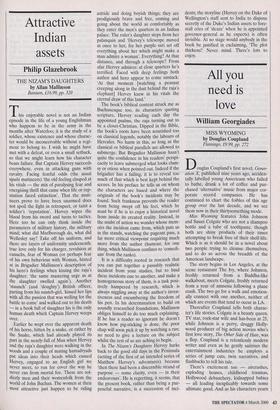Attractive Indian assets
Philip Glazebrook
THE NIZAM'S DAUGHTERS by Allan Mallinson Bantam, £16.99, pp. 320 This enjoyable novel is not an Indian episode in the life of a young Englishman who happens to be in the army in the months after Waterloo; it is the study of a soldier, whose existence and whose charac- ter would be inconceivable without a regi- ment to belong to. I wish he might have met with a defeat, or even a small setback, so that we might learn how his character bears failure. But Captain Hervey succeeds everywhere, even in attacking guns with cavalry. Facing fearful odds (the usual sipahi mutineers) 'the old feeling clasped at his vitals — the mix of paralysing fear and energising thrill that came when life or rep- utation faced extinction'. That the muti- neers prove to have been unarmed does not spoil the fight in retrospect, or taint a soldier's 'reputation'. Hervey wipes the blood from his sword and turns to tactics. Here too he can only think inside the parameters of military history, the military mind; what did Marlborough do, what did Wellesley say? Take off his uniform, and there are layers of uniformity underneath: true love only for his charger, revulsion at eunuchs, fear of Woman (or perhaps fear of his own behaviour with Woman, hinted at in Brigadier Mallinson's description of his hero's feelings when kissing the raja's daughter: 'the same mastering urge as at the slaughter swelled again'). Another `staunch' (and 'doughty') British officer, parting from his nautch-girl, 'kissed her lips with all the passion that was welling for the battle to come' and walked out to his death — in a book full of slaughter his is the only human death which Captain Hervey weeps over.
Earlier he wept over the apparent death of his horse, bitten by a snake, or rather by the Snake, which had already played its part in the nearly-fall of Man when Hervey and the raja's daughter were walking in the woods and a couple of mating hamadryads put ideas into their heads which caused Hervey, engaged to an English girl we never meet, to run for cover the way he never ran from mortal foe. These are sol- dierly men and their womenfolk from the world of John Buchan. The women at their most attractive just happen to be riding astride and doing boyish things; they are prodigiously brave and free, coming and going about the world as comfortably as they enter the men's quarters in an Indian palace. The ruler's daughter steps from her palanquin and 'Hervey's telescope moved at once to her, for her purple sari set off everything about her which might make a man admire a woman'. Everything? At that distance, and through a telescope? From afar Hervey admires: at close quarters he's terrified. Faced with deep feelings both author and hero appear to come unstuck: `At that moment [watching a peasant creeping along in the dust behind the raja's elephant] Hervey knew in his vitals the eternal draw of this land.'
The book's biblical content struck me as Buchanesque too, its characters quoting scripture, Hervey reading each day the appointed psalms, the raja turning out to be a closet-Christian. Dipped in the Bible, the book's roots have been nourished too on classical legends, notably the labours of Hercules. No harm in this, so long as the classical or biblical parallels are allowed to submerge. But Brigadier Mallinson hasn't quite the confidence in his readers' perspi- cacity to leave submerged what looks clum- sy or otiose when pointed out. Indeed if the brigadier has a failing, it is to reveal too much of that which is best kept behind the scenes. In his preface he tells us on whom the characters are based and where the originals of the book's incidents may be found. Such frankness prevents the reader from being swept off his feet, which he must be if he is to enjoy a historical novel from inside its created reality. Instead, in the midst of action we wonder whose mem- oirs the incident came from, which puts us in the stands, watching the pageant pass, a far more critical viewpoint requiring much more from the author (humour, for one thing, which Mallinson confines to 'comedi- ans' from the ranks). It is a difficulty rooted in research that you can put together a passably realistic incident from your studies, but to bind these incidents one to another, and make a homogeneous story of them, is a task posi- tively hampered by research, which is always niggling away at the author's inven- tiveness and encumbering the freedom of his pen. In his determination to build on soundly researched foundations, Mallinson obliges himself to do too much explaining. If he has a reader so ignorant he doesn't know how pig-sticking is done, the poor chap will soon pick it up by watching a run; no need to give a lecture on the subject whilst the rest of us are aching to begin.
In The Nizam's Daughters Hervey harks back to the good old days in the Peninsula (setting of the first of an intended series of Matthew Hervey's adventures) because `then there had been a discernible strand of purpose — some clarity, even — in their endeavours'. He is regretting, it seems, that the present book, rather than being a pur- poseful narrative, is a succession of inci- dents; the storyline (Hervey on the Duke of Wellington's staff sent to India to dispose secretly of the Duke's Indian assets to fore- stall cries of 'sleaze' when he is appointed governor-general as he expects) is often invisible. At no stage would anybody in the book be justified in exclaiming, 'The plot thickens!' Never mind. There's lots to enjoy.


































































 Previous page
Previous page